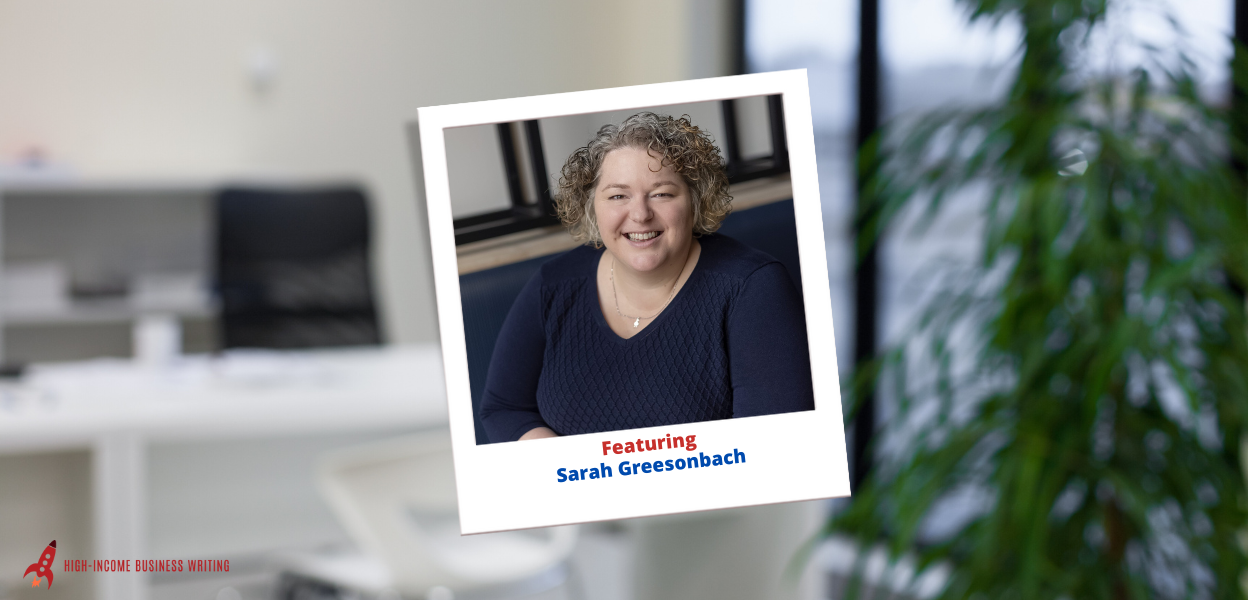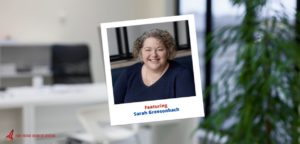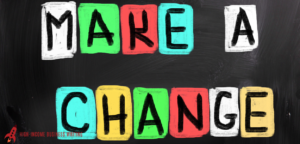This episode is very different from what I typically do on this show.
It’s a candid conversation between Sarah Greesonbach and me on a number of random topics.
Sarah is not only a very talented B2B writer, she’s also the founder of the B2B Writing Institute, an excellent coach to other B2B writers, a coaching client of mine and a friend.
We get into a number of topics, including where and how we face resistance … where we fall short … life experiences that shaped who we are today … how we make big decisions … fear … being kind to yourself … our pet peeves about the freelance industry …
And even the songs we have on our playlists that we’re embarrassed to admit to. What we love. And what we feel is overrated.
After our interview, I then share a raw and open account of my business struggles last year—what happened, why, and what I’ve done to navigate these challenges.
If you’re only looking for straight up advice for your business, this is not really that kind of episode. So feel free to skip it.
But if you’re curious about how Sarah and I have struggled. What we’ve learned. And what makes us who we are, give this one a listen.
It’s a long episode. The longest, in fact, of any episode I’ve created in my 11 years doing this show.
But I didn’t want to hold back. I wanted this to be exactly the kind of conversation Sarah and I might have at a Starbucks. And I wanted you to have an opportunity to listen to us talk with no filter.
Hope you enjoy it!
The notes that follow are a very basic, unedited summary of the show. There’s a lot more detail in the audio version. You can listen to the show using the audio player below. Or you can subscribe on Apple Podcasts, Spotify, Stitcher, Google Podcasts, Amazon Music or wherever you listen to podcasts.


High-Income Business Writing with Ed Gandia
#340: Ed Gandia and Sarah Greesonbach Get Raw and Real About Their Inner Battles, Fears, Aspirations—and What It’s Like to Be a Coach
Key Topics and Bullets:
- Insights on the Enneagram and its influence on personal growth
- Importance of empathy and personal growth, value of coaching in providing perspective and support
- Overcoming a victim mentality, treating freelancing or writing as a business, and adapting to change
- Power of choice and resilience in the face of challenges, addressing blocks in client progress
- Acknowledging life’s unexpected obstacles and the deeper value of coaching
- Outlining the aspects of coaching: codification, collaboration, contemplation, and conversation
- Discussion on decision-making frameworks and overcoming fear as a freelancer
- Admitting mistakes in business operations and navigating difficulties with a coach and mentor
- Focus on stabilizing and growing the business, serving and adding value to the audience
- Overcoming fear and feeling inadequate in sales as a freelancer
- Applying “the obstacle is the way” mindset in difficult situations
- Emphasizing the need for compassion, self-reflection, and creating strong boundaries
Timestamp Overview:
00:00 Ed– I wanted to have this conversation. You sound like you were a game for it, which I’m-I’m glad you were. And just a little bit of background, I guess. You know, I know, none of my podcasts are really that scripted so when it’s a monologue, I do have notes, you know, because I don’t wanna make sure I don’t go down a bunch of rabbit holes and lose my train of thought. But I don’t script up my podcast. And when it’s an interview, I have some guiding questions that I’ll send the guest. It’s still not scripted, but I have been really bad about, like, just giving everyone a glimpse into my world. Right? Like because I feel like, it’s not that I-I guess I’m somewhat of a private person, but I-I don’t think I’d say that’s about me, not about them.
07:10 Ed– So, let’s start here. I’m curious about your younger days, young Sarah. And, specifically, what’s a formative experience you had as a young person that has shaped you into who you are today.
Sarah– Well, she was awesome. I’ll just say that. I think it should be very clear. And her number 1 hobby was to go out on her bike into the woods with an apple and just read for a couple hours. Which looking back, I mean, that really-that defines me now too, I think, because that’s one of the things that I would just love to do, but that I tend to put off. And I think the reason I did that was because I grew up with 3 older brothers. And so I was trying to get some peace and quiet to myself and to not be, I don’t know if I was picked on, but, you know, they didn’t chase me around and breathe garlic in my face, like, for fun. That was like a sport for them.
13:48 Sarah: Well, that kinda bleeds into the next question. I think in my natural state, I would be in the woods reading for sure. But one of the things that I’ve had to resist a lot, that I’ve Struggled with a bunch, is taking the time to do things that are just pleasurable and fun. Yeah. So it’s like, if it’s not giving me ahead in some way or, like, a literal chore that I can check off the list. I just won’t let myself do it. So reading has been one of my professional development goals of just sitting down and enjoying a book during the work day for, like, 2 years.
16:45 Ed– So there’s this constant battle, but the inner critic is the stealthiest little, you know what. Yeah. That’s my take. I don’t know. What do you resonate with that? Do you think there’s something else to it?
Sarah- It’s wild that you ended up with safety because what came to mind for me is it’s not safe to enjoy yourself or to have fun. And if you do, that’s the moment something just horrible is gonna happen, or you’re gonna be neglecting something really important. So the only way I’ve been able to get around that is to set a timer and be like, for the next 10 minutes, it is safe. I’m allowed to read this book. It’s gonna be fine. And then I start it. Have you always had that awareness of the resistance? Like, did you always know that something like, your new critic was keeping you from it?
26:33 Ed– too much of a reward actually works against you. So, again, that achiever mindset of, like, I’m gonna work really, really hard, but then there’s just gonna be this thing at the end of the tunnel, this pot of gold at the end of the rainbow, and, that gets me into trouble. You know? I’m pretty good about exercise, diet unless I really put guardrails and controls there. I’m pretty bad because of the way that I think of and treat food just as a as a reward. And I get so much joy, you know, out of are just trying something new, making something special. But because I’m not at a restaurant where they’ve given me a certain portion
Sarah- How do you figure out how much joy is acceptable in the things that you love Before it becomes a problem.
29:18 Ed– What is something that gives you hope?
Sarah– This one I knew right away, and it’s whenever I see someone younger than me doing something wonderful because I had this really profound experience when I was a teacher. Well, that part sucked. But one moment when I was a teacher, they asked for volunteers to judge a storytelling, like, arts competition for young kids, and it was like, maybe 9th graders and 7th graders. So people who were, How old is that? Like, 12 and 13. And, usually, my experience with kids is just that they were goofballs, and they weren’t really trying very hard at anything. But I walked in, and these kids were just, like, poised in it and doing the dramatic monologues and memorizing stuff, and they were just… They really blew me away telling these classic stories, and that just gave me a lot of hope that the next generation is gonna do stuff at all, but then do it really well and maybe even better than I could.
35:42 Ed– Let’s talk a little bit about frameworks to make decisions, specifically big decisions. This is something that came up. I know you got stuff that you use. I’m curious to hear when you got something, a big decision in front of you, what do you do? How do you make it? What tools do you use?
Sarah– Well, I think this is where you’re really gonna shine because I don’t have a lot that I do. Mainly, I send people to your PCRQ matrix. And I realized while I was reflecting on it, I think it’s because I tend to make decisions with so much instinct that it’s not about how I make the decision, it’s more about giving myself enough time to make the decision. So it’s like, once I sit down and really think or write out whatever the scenario is, and then I have to give myself maybe 3 days to a week, and it’s almost like the sand in a what’s the time thing that you flip upside down? That princess Jasmine was stuck in. Hourglass. That sand in the hourglass, and you’ve gotta give it enough time for whichever side to get enough sand so that I just feel like I know what the next decision is. And I I wouldn’t have said I made really instinctual decisions until I sat down to think about it like this.
40:35 Sarah –I have a question for you kinda based on that. I tend to work with people who, for whatever reason, aren’t really sensitive to what their gut is saying or their instinct, and they’ve learned to push down any of that, and really only evaluate things on the surface and look at the pros and cons. Have you found that to be the case as well, or how do you help people kinda get more sensitive to the weight of things instead of just what looks right or what adds up?
Ed– Yeah. I and I have. And I think many people are that way. I agree, not just your people, like, people I work with too, and what I have them do is I can’t do that work for them. And I’ll send them off with some journaling prompts, some questions to ponder. I encourage them to write about it, but they need you to unpack it. Yeah. Right? I mean, because I can, I may know the answer based on everything I know about you, but now it’s me? I’m now taking ownership of it, and now I’m giving you answers.
43:15 Sarah– I’m curious, because you’re just sitting on, like, a mountain of having helped thousands of people do this. I’m really curious, like, the secrets you can offer people About freelancing and, like, what they learn when they coach with you and stuff. So the way I frame that is if you had to think of one thing that most people do that’s preventing them from achieving whatever their goals are with freelancing. Mhmm. What comes to mind for you? What’s kind of a common denominator with obstacles?
Ed– I would say it would have to be fear. I would have…it would have to be fear because everything comes back to that, doesn’t it? You know? It could be self imposed limitations, limiting beliefs. It could be any of those things, but they all point to… they all point to fear. I mean, what do you think?
48:28 Sarah– The question is, who do you think you are telling people that the obstacle is the way? Now, I have come around to this, obviously. It’s true. But I’m really interested in how you compassionately apply this idea that the obstacle is the way and that bad things can ultimately be good things, 2 people that you’re working with. And I think I’m coming at it from the experience of, like, a really rough time with parenting, Some wild chronic health stuff that in my wildest imagination couldn’t have anticipated. But somehow, you made it okay for me to look for the positives in all of these horrendous things, and I just can’t help but think that that might be awkward sometimes When you are in a position to tell people, like, maybe this is a good thing. Let’s look for the good things that are happening. So how do you do that?
Ed– It’s a great question. The first thing is I believe that you don’t have to have had those same experiences as somebody who’s going through them right now, in order to be compassionate, in order to be credible, you know, with your guidance and advice. That’s the first thing. Because if I have to have experienced every single thing, that’s gonna limit the universe of people I can work with to a very small group. Does it help to have experienced, you know, some of that. Yeah. It certainly does. And many times, I can commiserate.
55:14 Ed– It’s been fun. What is a pet peeve of yours, when it comes to the freelance industry or coaching freelancers or, you know, coaching in this industry?
Sarah– I have a lot of mild takes that I share on LinkedIn. So I’ll try to skip the ones I’ve shared before. And I think, this one, I actually fell into it myself before I was coaching, I think, before I was a coach to people. And I think it’s thinking that what you need is an answer when in fact, what you need is, like, that perspective in that relationship from somebody. Because the answers are like, the Internet is just literally exploding with answers constantly, so you can find the answer to pretty much any question that you have. But knowing when to apply it or when it’s relevant or when to push on it versus letting someone rest and just absorb what’s happening in their lives, That’s why I don’t think googling or the DIY path is ever really gonna be a threat to coaching.
01:01:34 Ed– So let’s talk a little bit about what you wish more people understood about what it’s like to be a coach.
Sarah- Well, you already took my answer before so… We probably shoulda compared notes, but It absolutely kills me when people come to a call or even wanna reschedule a call because they’re feeling guilty, and they haven’t done anything or made any progress. That just kills me. So I-I want everyone to know that, at least with me, I feel like with all coaches, when you’re getting together, it’s really not about going down the checklist of what you have and haven’t done and grading you on that and deciding in my mind if you’re a failure or a winner or, like, whatever is happening in your head. It’s really just about being in a relationship with you and figuring out if we haven’t made progress. Could there be any blocks that are happening that we can address versus, like, actual life mayhem that happens to everyone?
01:08:43 Ed– And when there’s a high degree of emotion, the lesson sticks. Okay? So sounding board, brainstorming buddy. Right? It’s having that pal, that partner, that thought partner, problem solving, all those things. So that’s the collaboration. The 3rd c is contemplation, creating space for self discovery, to meet yourself differently. You know? A good coach will provide that kind of space for you. So you can ask yourself a different set of questions. Think a little differently.
01:14:13 Sarah– What song or songs are on your regular playlist that you’re embarrassed to admit to?
Ed– Alright. So you’re not gonna be embarrassed. You’re gonna be happy, but I’m embarrassed to admit this. Taylor Swift, 2 songs, Delicate and a remix of Lavender Haze. It’s just a dance remix of Lavender Haze. They’re both fantastic.
01:20:28 Ed– Last rapid fire. What do most people… let’s flip it. What do most people think is overrated that you love?
Sarah– Now this one, I have a good, silly answer, and that is pens, Because I have become obsessed with fountain pens, and I am now a collector. And, yes, they’re all the same. And, yes, they all write just as well as the other ones. But, yes, I need 20 of them.
01:24:26 Ed– So I want everyone to know that, you know, just because we’re coaching others doesn’t mean that, you know, we don’t face challenges. We certainly do.
Sarah– Yeah. And that does come full circle a little bit because the obstacle is the way stuff. I think the time I started making the most progress was that Was right after I started coaching, and I would talk with people who were going through maybe just some really trying devastating personal stuff. And it’s like, when I took a call like that, and let’s say, you know, just something happened in the person’s personal life and, My ability to empathize with that and and understand and really be there for them because I had gone through the same absolutely crappy kinds of things, I think that’s when it started to really become true that I could see like, it was good that I went through that even though I was a wreck at time. Because now I can be there for this person in this really special way. And I think before, maybe that would have sounded kind of hokey and dumb. But in that moment, it felt like magic that I could really be there for them.
01:29:20 Ed-I had to start all over. I-you need to understand that most of my business operations, I don’t know how to run. Done a lot of things wrong, but one thing I feel like I’ve done really well is understand and admit where I have strengths and where I have weaknesses, and then find people who can fill in roles and functions that I don’t do well. And Crystal filled so much of this for me for a long, long time. So when she left abruptly,I I only had 1 other person on the team, and she did an amazing job, Ashley. But, you know, she wasn’t Crystal and that she wasn’t privy to, a lot of the behind the scenes stuff, a lot of the more tactical and technical aspects of the business, but she stepped in, and she was amazing. But it was clear that, you know, that her role was not going to be to take over Crystal’s job. So I had to start all over finding a new operations manager to run business operations for me.
01:34:46 Ed–I credit a lot of just kinda getting through this to the work that I did with my coach and mentor, Peleg Top, last year, which I’ve mentioned here in the interview with Sarah. It’s no coincidence, I feel, that a few months before the, 2023 started, so this is must have been around November, December 2022, I committed to working with Peleg on a very intense 100 day program that was gonna start in late January of 2023, and it’s a program that happened to start right when things were blowing up all around me in my business. And I’ve I’ve I credit the deep work that Peleg and I did over those 100 days to helping me weather that storm. The other thing is that good financial discipline over the past few years enabled me to get through it again from a financial standpoint. And I’m proud of the fact that we’re now in a really good position to stabilize the business and grow from here. We have some exciting plans for this year, including some new offerings we’re gonna be testing. I have no idea how they’re gonna work, but I’m excited to start testing new things. It’s been a while since I’ve tested some new and exciting offers.
01:38:03 Ed– My audience grows every month, gradually, not not by very much, every month. But I’ve come up with some new ideas that I-I feel are gonna make a big difference, and I’m gonna be purposefully, mindfully working on growing the audience. So why am I telling all, hopefully, I haven’t bored you to death by now, but I want you to know that last year was a crappy year for me in many ways just like it was for a lot of people in my audience, maybe even for you. And I don’t think I did a very good job of expressing that in today’s episode. So I-I wanted to just come clean and just be completely transparent with you and just share some of these struggles and what happened and what I did about it and the fact that, hey. It wasn’t all pretty. I-I-I-I wish I could tell you that I did swimming, but I I did not. There are many weeks where I really struggled with as and there were days when I thought, what’s the point of doing all this? I should just shut this thing down and go do something else. And that happens. I-I-I don’t think I think if you don’t experience that every once in a while, you don’t have enough challenges in your business or your life. So, looking back, I’m-I’m-I’m glad I’m glad I had the obstacles. And I want you to know too that I have a lot of empathy for freelancers who have struggled and found themselves in a difficult situation, especially over the past year. You know, you have taken a chance going out on your own. You take the hits every day. You have way more on your shoulders than your traditionally employed colleagues because it’s all on you. You know? By default, anyone who’s traditionally employed has others.
By the way… whenever you’re ready, here are 4 ways I can help you grow your freelance business:
1. Grab a free copy of my book.
It’s called Earn More in Less Time: The Proven Mindset, Strategies and Actions to Prosper as a Freelance Writer. The title says it all. 😉 — Click Here
2. Get my Business-Building Toolkit.
Too many freelancers lack a critical set of business skills that would enable them to earn more in less time doing work they love for better clients. I’ve taught these skills to my coaching clients for years. And now I’ve packaged it in a way that will enable you to start getting results FAST. — Learn More
3. Join my implementation program and be a case study.
I’m putting together a new implementation group this month. If you’re earning $5k+/month (or the part-time equivalent) from your freelance business … and you’d like to grow your income quickly with better clients … just hit reply and put “Case Study” in the subject line.
4. Work with me privately.
If you’re a 6-figure writer who’s trying to earn more in less time, with less stress, I might be able to help you get there faster than you think. Just email me at ed@b2blauncher.com and put “Breakthrough” in the subject line, and I’ll get back to you with more details.






